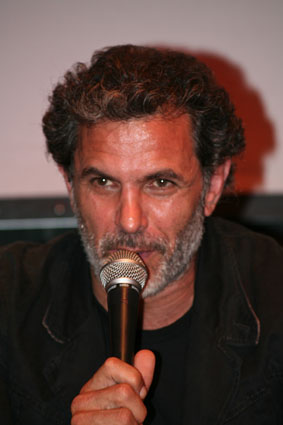Lawyers: Murder not classified as security crime, therefore Shin Bet has, by law, no authority to investigate.
Juliano Mer Khamis in Paris, 2006.
Photo © Christiane Passevant
The Shin Bet security service is exceeding its authority by investigating the April 4 murder of Juliano Mer-Khamis, who served as general director of Jenin’s Freedom Theater, two lawyers involved in the case have charged.
Abeer Baker, representing Mer-Khamis’ family, and Smadar Ben-Natan, who represents one of the suspects, argued that because the murder is not classified as a security crime, the Shin Bet has, by law, no authority to investigate.
At a remand hearing last Wednesday for Adnan Naghnaghiye of Jenin, who worked as the Freedom Theater’s location and stage manager and lived above the theater, Ben-Natan asked whether the crimes of which he is suspected "include any element of a security offense." The police representative, detective Nasser Salah Nasseraldin, replied: "No, he’s suspected of murder."
The Shin Bet began investigating almost four months after the murder, once it became clear that the Palestinian Authority was making no progress. Though Mer-Khamis worked in Jenin and the murder took place there, he was an Israeli citizen.
The Shin Bet probe focused on four people: Naghnaghiye; Bilal Saadi, a member of the theater’s board, who was arrested on July 27; Raida Sawalem, the woman who takes care of Mer-Khamis’ son and was in the car with him when he was murdered; and Rami Hwayel, an acting student at the theater. Sawalem wasn’t arrested, but was questioned three times.
Both Naghnaghiye and Saadi were arrested on suspicion of involvement in the murder. Saadi is also suspected of membership in the Popular Front for the Liberation of Palestine.
Officially, Israel Police is responsible for the investigation. But in a conversation between Baker and one of the police investigators, it became clear that the police hadn’t known of the arrests in advance - even though in court, Nasseraldin said the police and the Shin Bet were cooperating.
Both Saadi and Naghnaghiye denied any involvement in the murder. But based on classified material that the Shin Bet submitted to the military court via the police, the court decided to remand them until next Monday.
Ben-Natan asked whether the police were also investigating people unconnected with the theater, given that Mer-Khamis had complained of receiving threats from people who opposed his work. Nasseraldin said yes, but admitted that the classified material contained nothing about any other lines of inquiry.
It also emerged during the hearing that the police never asked the PA for the statements its investigators had collected from eyewitnesses and other people questioned in the case.
Rami Hwayel, the acting student, was arrested on August 6, but was able to prove that he was on the theater’s second floor when the murder occurred. Consequently, the court found no grounds for holding him as a murder suspect - but remanded him anyway on suspicion of having once entered Israel illegally.
Relatives and friends of Mer-Khamis said they are pleased that efforts are being made to find the murderer, but deplore the methods being used by the Shin Bet, which violate the suspects’ rights. For instance, Saadi and Naghnaghiye have been barred from meeting their lawyers ever since they were arrested two weeks ago. Ben-Natan said such draconian measures are rarely taken in ordinary criminal investigations.
Moreover, she said, the Shin Bet, unlike the police, routinely subjects suspects to sleep deprivation, handcuffs them while they are being questioned and doesn’t videotape interrogations. Saadi, for instance, complained to the judge that he was deprived of sleep, had to see a doctor four times due to the treatment he suffered while being interrogated, and, although he was given food, was unable to eat it because his hands were cuffed.
The Shin Bet responded that the investigation "is being conducted jointly by the Shin Bet, the Israel Defense Forces and the Israel Police, in light of the fact that an Israeli citizen was murdered and the suspicion that the murder was carried out for nationalist reasons. Coordination between the Shin Bet and the other security services is being conducted in accordance with the routine procedures used in all Shin Bet investigations."

